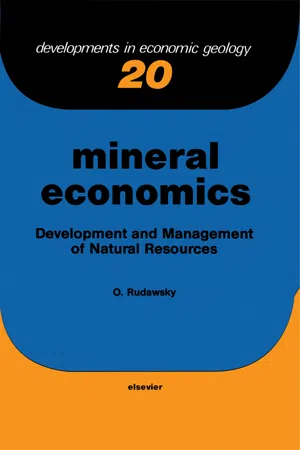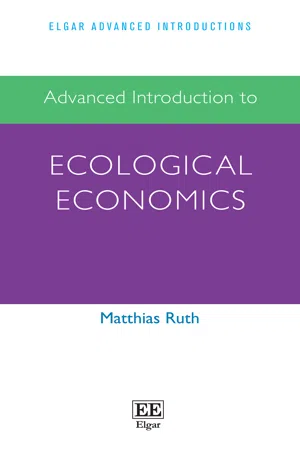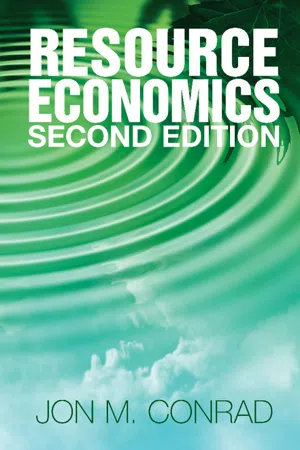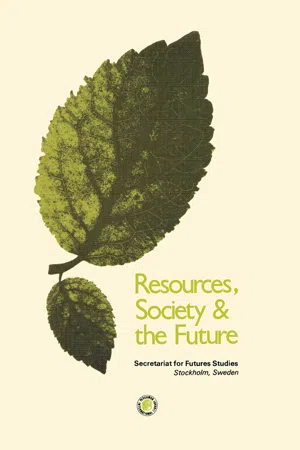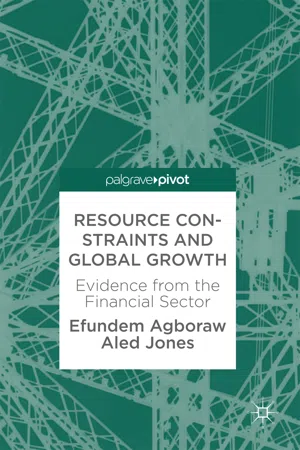Economics
Economic Resources
Economic resources refer to the inputs used in the production of goods and services, including natural resources, labor, capital, and entrepreneurship. These resources are limited in supply, which gives rise to the fundamental economic problem of scarcity. The efficient allocation and utilization of economic resources are central concerns in economics.
Written by Perlego with AI-assistance
Related key terms
1 of 5
6 Key excerpts on "Economic Resources"
- eBook - PDF
Mineral Economics
Development and Management of Natural Resources
- O. Rudawsky(Author)
- 2013(Publication Date)
- Elsevier Science(Publisher)
1 PART I: INTRODUCTION AND AN OVERVIEW CHAPTER 1 NATURAL RESOURCES - DEFINITIONS AND CLASSIFICATIONS Every textbook on principles of economics lists several factors directly employed in the production of goods and services. These factors, interchangeably termed inputs, factors of production, or resources, are usually classified into three (and sometimes four) general categories: 1) Land includes all naturally-occurring substances that are useful for mankind. Using the broadest possible definition, land includes also surface and subsurface products and minerals (such as timber, fish, and energy fuels), as well as water and air. 2) Labor, also termed human resources, includes available manpower and the skill and expertise the workers can offer. 3) Capital refers to man-made assets, such as equipment, machinery, and buildings that are being utilized in the production process. Usually, this input is quantified by its monetary value (i.e., the total investment in capital assets). 4) Some economists prefer to add a fourth category -- enterpreneurship> Although this factor is composed of both labor and capital, and therefore is not independent of the previous inputs, it still serves a yery useful purpose in combining all other inputs, in the appropriate ratios and at the proper time and location, to make the production process feasible. In studying natural resources, the previous general classification of inputs is inadequate. We are mostly interested here in the land category, but much more detailed analysis and refinements of this term are needed. A clear distinction among the various components of land (such as renewable and non-renewable natural resources) and their specific technical and economic characteristics is required. At the same time, the interaction of land with all other factors of production should also be studied. All of these aspects are briefly presented and discussed in the current chapter; mineral and energy resources are specially emphasized. - Wesley C. Mitchell(Author)
- 2017(Publication Date)
UNIVERSITY OF PENNSYLVANIA BICENTENNIAL CONFERENCE Economic Resources and Their Employment By W E S L E Y C. M I T C H E L L , PH.D., L L . D . , D.LITT.· E C O N O M I C R E S O U R C E S I N E C O N O M I C T H E O R Y ECONOMISTS call the resources that men use in getting their livings factors of production. Adam Smith and his early dis-ciples recognized three groups of these factors: land, labor and capital. Land stood for natural resources in general—not only arable soils but also all useful materials found in the earth, and all useful things growing wild upon it. Labor included all efforts directed toward the production of commodities or serv-ices, from the crudest manual toil to the most refined of man-agerial, artistic, or scientific activities. Capital meant all objects made by man that are used in producing other goods. It was long the practice to include under capital even clothing and stocks of food—necessities men must have if they are to work on goods that require weeks or years to complete. This classification of the factors of production bears the institutional stamp of the country and time in which it pre-vailed. The British of Adam Smith's and Ricardo's genera-tions recognized three economic classes—landlords, laborers, and capitalists. Production of wealth required their co-opera-tion, and the wealth produced was distributed among them as rent, wages, and profits. T o understand economic activities as thus organized, there seemed no need to include factors of production for which no price had to be paid, such as the freely available forces of nature that can be harnessed to men's uses. Nor did it seem necessary to mention separately the most im-portant of human resources—man's knowledge of how to utilize his environment. The laborer's knowledge went into the work for which he was paid along with his muscular energy. The capitalist's knowledge was involved in his service as a captain of industry.- Matthias Ruth(Author)
- 2018(Publication Date)
- Edward Elgar Publishing(Publisher)
2.2 Allocating resources to meet human needs Economics is often defined as the discipline that studies how scarce resources could optimally be allocated to meet the needs of humans. A brief reflection on this definition reveals a few basic insights of rel- evance for our subsequent discussion. 14 ADVANCED INTRODUCTION TO ECOLOGICAL ECONOMICS First, note that this definition implicitly assumes that the needs of humans are given, and humans, with their needs, have some control over the natural environment from which the resources are extracted and into which wastes are released. But the term “resources” in this definition is broader than just natural resources. It includes also, for example, human resources, capital goods and intellectual property. These, too, are subservient to the goal of optimal allocation. Labor with different levels of qualifications, tools and machines, and copyrights, for example, are bought and sold on markets in efforts to help better meet the needs of those who offer them and those who acquire them. An economics that instead started with the resources as given and that presumed that the needs are the object of adjustment, would be a rather different kind of economics than the one implied by the defini- tion above. Such an economics would ask: For a given endowment of resources, what adjustments to the needs of humans must be made and how, to assure that transactions do not violate long-term con- straints on their sustainable use? What uses of natural resources keep extraction and waste generation within biophysical boundaries? What exchanges of labor and investments in capital are socially acceptable? What kinds of rights on intellectual property need to be established and protected to incentivize the generation of new knowledge and how much of that knowledge should be in the public domain? Ecological economics straddles these two different perspectives on the role of needs in allocating resources.- eBook - PDF
- Jon M. Conrad(Author)
- 2010(Publication Date)
- Cambridge University Press(Publisher)
1 Basic Concepts 1.0 renewable, nonrenewable, and environmental resources Economics might be defined as the study of how society allocates scarce resources. The field of resource economics , would then be the study of how society allocates scarce natural resources, such as stocks of fish, stands of trees, fresh water, oil, and other naturally occurring resources. A distinction is sometimes made between resource and environmental economics , where the latter field is concerned with the way wastes are disposed and the resulting quality of air, water, and soil serving as waste receptors. In addition, environmental economics is concerned with the conservation of natural environments and biodiversity. Natural resources are often categorized as being renewable or nonrenewable. A renewable resource must display a significant rate of growth or renewal on a relevant economic time scale. An economic time scale is a time interval for which planning and management are meaningful. The notion of an economic time scale can make the clas-sification of natural resources a bit tricky. For example, how should we classify a stand of old-growth coast redwood or an aquifer with an insignificant rate of recharge? While the redwood tree is a plant and can be grown commercially, old-growth redwoods may be 800 to 1,000 years old, and the remaining stands may be more appro-priately viewed as a nonrenewable resource. While the water cycle provides precipitation that will replenish lakes and streams, the water contained in an aquifer with little or no recharge may be economi-cally more similar to a pool of oil (a nonrenewable resource) than 1 2 Resource Economics to a lake or reservoir that receives significant recharge from rain or melting snow. A critical question in the allocation of natural resources is, “How much of the resource should be harvested (extracted) today?” Finding the “best” allocation of natural resources over time can be regarded as a dynamic optimization problem. - eBook - PDF
- Sam Stuart(Author)
- 2013(Publication Date)
- Pergamon(Publisher)
2 Resources and Raw Materials Defined Introduction One cannot discuss any problem without understanding the terms employed in the discussion. This applies particularly to resources and raw materials, because many differences of opinion - for example, concerning the length of time that minerals can be expected to last - are attributable to the use of different concepts. In the present chapter, the terms are discussed with reference to figure 2. Substances are elements, chemical compounds or mixtures having specific chemical or physical properties. Natural resources are those substances in the soil, water or the atmosphere which in principle can or could be used by man. In the ultimate analysis a natural resource represents the properties possessed by certain substances or combinations of substances, e.g. having a certain electrical conductivity, being hard or being resistant to acids. This becomes particularly apparent when soil, air or water are referred to as natural resources, because the important thing may well be, not the actual substances present in the resource but the properties of those substances - for example, being a basis of biological production (soil, water ), or having the capacity to absorb and carry off substances(water). 'Resources' are those parts of natural resources which are known and accessible and which it is believed can, come to be used under foreseeable technological and economic conditions. Reserves are those parts of resources which are already sufficiently known and accessible to be utilized profitably with the available technology. Raw materials, finally, aqp substances or mixtures of substances which, in one form or another, are used in industrial or other processes in order to manufacture a product. We may already here observe that the raw material, reserve and resource concepts are not timeless. New technology and changes in the prices of raw materials may have the effect of widening the resource base. - eBook - PDF
Resource Constraints and Global Growth
Evidence from the Financial Sector
- Efundem Agboraw, Aled Jones(Authors)
- 2017(Publication Date)
- Palgrave Pivot(Publisher)
2 Economics and Natural Resource Constraints 23 depends not only on the current rate of production but also on past production. The accumulated production affects both cost and demand. The cost of extraction increases as the mine goes deeper; and durable substances, such as gold and diamonds, by their accumulation influence the market (Hotelling 1931). In a hypothetical market with free competition, Hotelling assumes the resource owner is indifferent whether he receives a price for a unit of his product now or a price after some time has elapsed. This will not apply to monopoly, where the form of the demand function is bound to affect the rate of production, but is characteristic of completely free competition. The various units of the mineral are then to be thought of as being at any time all equally valuable, excepting for varying costs of placing them upon the market. If interest rates vary among the resource owners, this fact will also affect the order of extraction. In an imperfect market situation, if the resource stock is in under monopolistic protection, the marginal value to the owner of the stock of resource left in the ground will be equal to the marginal profit it can bring on the flow market once extracted. To a monopolist, this is less than the net price. The asset markets equilibrium condition will still require that the rate of return on the resource stock be equal to the rate of interest. Only now the rate of appreciation of the ‘in-situ’ value is not measured by the rate of change of the net price, but by the rate of change of the monopolist’s marginal profit. Hence, marginal revenue will rise at the rate of interest (Gaitan et al. 2006). Natural resources are as important to the growth and development of an economy as physical and human capital. Natural resources are part of the real wealth of a nation and they are the natural capital where all the other forms of capital are made (OECD 2011).
Index pages curate the most relevant extracts from our library of academic textbooks. They’ve been created using an in-house natural language model (NLM), each adding context and meaning to key research topics.
